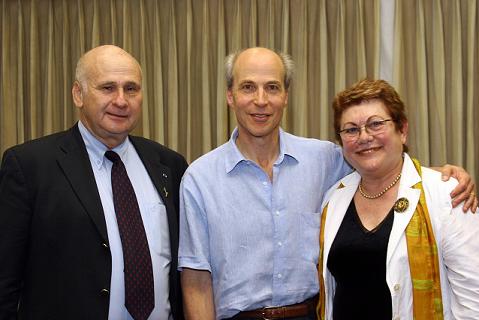Prof. Roger Kornberg and all those congratulating him on the occasion of his win, including the Minister of Science, at a special event held yesterday at the Hebrew University: The world is moving forward - Israel withdraws

"The budgeting for research in Israel is deteriorating, and in the four years it has dropped by no less than 30 percent. Israel's future depends on this investment and Israel's ability to bring back outstanding scientists after a postdoctorate abroad." This is what the recent Nobel laureate for chemistry, Prof. Roger Kornberg, said in a conversation with the Hidan site. According to him, we must repeat this message at every opportunity and make sure it is received. I am aware that the Ministry of Finance receives competing requests for these budgets from many interested entities. It should be made clear that science is the most important thing right after security, in order to maintain Israel's quality position. In particular, it is important to note that all over the world the importance of scientific research is recognized, and more budgets are allocated to it, while Israel is not only not stepping on the spot, it is retreating.
Korenberg also said that for the periods of several months a year when he was at the Hebrew University at the same time as his work at Stanford, there was a contribution to his winning the award because it was given for his work over the past twenty years in which he received assistance, a laboratory and all the necessary equipment, and lectured to advanced degree students and those students wrote articles that he learned from . One of these students, Avi Ginat, did a post-doctorate with him at Stanford, some of the things that Ginat researched are the ones cited by the Nobel Prize Committee. Prof. Hermona Sorek, dean of the Faculty of Exact Sciences and Mathematics at the Hebrew University, stated that the same Ginat is today a professor at the University of Maryland, and the universities in Israel have no option to return him.
The president of the Hebrew University, Prof. Menachem Magidor, also warned that the current situation cannot continue. He also accepted the overdispersion of research budgets and the leakage of funds from universities to colleges and brought as an example the state of California, where the state, where 30 million inhabitants live, supports only 12 universities.
The head of the Institute of Life Sciences at the Hebrew University, Prof. Yoav Kabanznik, said that the institute is proud that one of its senior teachers received this prestigious award. "We are proud because you are part of us and we know we are also part of you, you showed us that. Your loyalty and our representation in many forums. I want to thank you for being a part of us for almost 20 years. I am sure that in the spring you will return to us with Yahli, and give lectures and continue your research. On behalf of the institute, for the years and the great pride you have brought us. We thank you.
"The current government must stop the deterioration in research budgeting in universities, government ministries and industry, and I will push in this direction and serve as the chairman of the science lobby in Israel. This is what the Minister of Science, Culture and Sports said in a conversation with the scientist website, who also spoke at the event itself. According to Minister Pines, part of the blame also lies with the universities that transferred funds intended for research for teaching purposes. However, according to him, the cut in research budgets is the result of short-term vision of the Israeli governments. I hope this phenomenon has been curbed this year but not fixed. We also want to correct this distortion. "I hope there will be a different order of priorities for the research field. I checked what goes into the research and it is worrying and dangerous. Starting with the issue of the chief scientists in the government ministries that their budgeting is some kind of unsuccessful joke. If the chief scientist of the Ministry of Education receives NIS 10 million out of a budget of NIS 10 billion, someone has to give an explanation for it, as mentioned in the Ministry of Health and other ministries, and even the office of the chief scientist at the TMT was cut by NIS 200 million. Large parts of university budgets go to teaching and not to research. The dynamic is an unfavorable dynamic and it occurs not because people do not appreciate the importance of science, but because it is easier to cut back on science because it is a long-term investment, because fewer people are immediately harmed, a dangerous view that rests on political foundations. There is no policy - what to focus on, what to leave, what to invest more and what to invest less according to national priorities - not even personal, not faculties. I am entering this niche and will try to do something to improve, there is a lot of work." Pines concludes.
